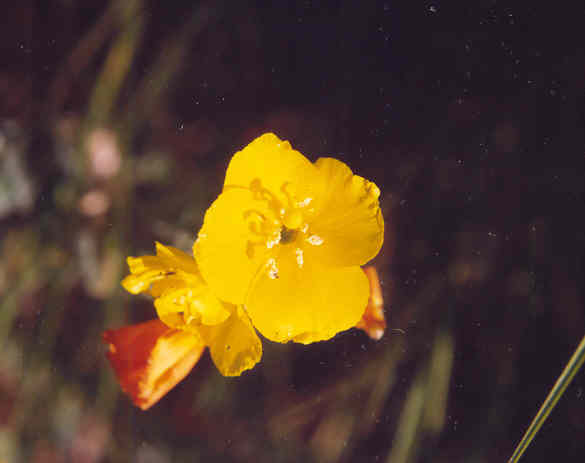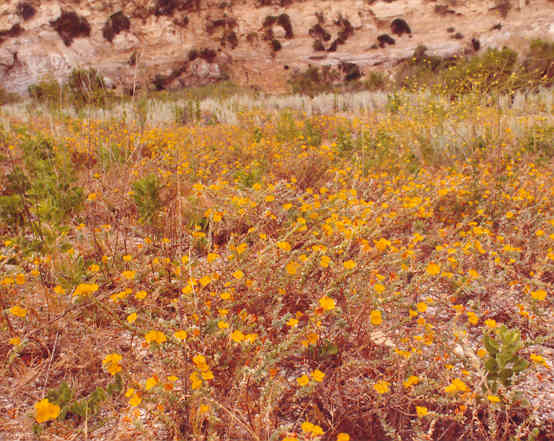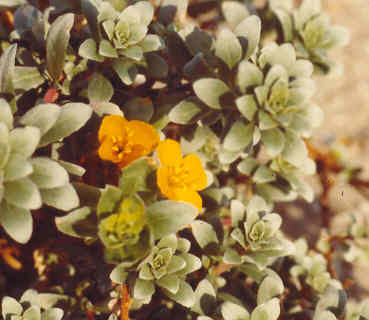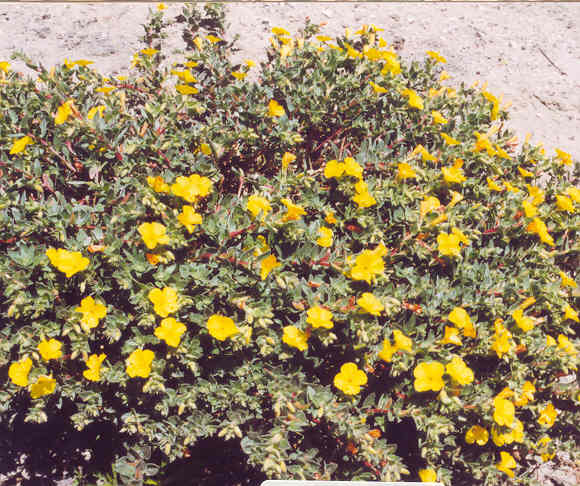
Camissonia cheiranthifolia (Sprengel) Raim
ssp. suffruticosa (S. Watson) Raven
=Oenothera cheiranthifolia
ssp. suffruticosa
 |
Camissonia cheiranthifolia (Sprengel) Raimssp. suffruticosa (S. Watson) Raven=Oenothera cheiranthifoliassp. suffruticosa
Onagraceae (Evening Primrose Family)NativeBeach Evening Primrose |
May Photo
Plant Characteristics:
Perennial with several prostrate to decumbent wiry stems radiating from a
central rosette, these 1-6 dm. long; plant grayish-pubescent throughout; lvs.
thick, those of the rosette oblanceolate, 1-7 cm. long, narrowed into petioles
1-2 cm. long; lower cauline lvs. lance-oblong, subsessile to short-petioled,
obtuse, subentire, 2-4 cm. long, the upper still shorter and broader,
oblong-ovate; fls. in axils, mostly above the base of the stems; fl. tube 2.5-5
mm. long; sepals 4-10 mm. long; petals bright yellow, with or without reddish
spots near the base, drying green or red, 5-9 mm. long; stamens unequal.
Habitat:
Coastal Strand, Pt. Conception to n. L. Calif.; sand hills and sandy
beaches along the coast. March-July.
Name:
The specific name means that the leaves are like that of the Cheiranthus, an old name for a Wallflower now renamed.
Suffruticosa leads to the
English word "suffruticose" which means "very low, barely woody
and shrub-like." (Dale 141).
General:
Occasional in the study area. At
one time this plant was very common on the Northstar Beach.
However, in recent years, the County has disked the area each year and
has destroyed most of the plants and more recently, the rowing center was built
taking much of the original area on the beach.
Photographed on the Northstar Flats.
(my comments).
The seed oil of O. biennis, has recently been used as a source of gamma linoleic
acid, GLA, which is supposed to have properties that lower blood pressure, cut
down the rate at which cholesterol is made in the body, as a treatment for
eczema, arthritis, hyperactivity, cancer and inducement of labor.
(ref. not recorded).
It has been noted by Wayne T. Williams, that the bumblebee, (Bombus
sp.) is the only insect pollinating C.
cheiranthifolia in the El Morro area. Due
to the high winds, the flowers all face down wind, these large bees approach
upwind for greatest flight stability. (FREMONTIA, A Journal of the Native
Plant Society, author and date unrecorded).
Generally cross-pollinated in contrast to ssp.
cheiranthifolia which is self pollinating.
(Hickman, Ed. 782).
Ssp. suffruticosa confirmed by
a field check on a Northstar Beach specimen in April 1994. (my comment).
Text Ref:
Hickman, Ed. 782; Munz, Calif.
Flora 956; Munz, Flora So. Calif.
592; Roberts 30.
Photo Ref:
Dec 3 83 # 17; April 1 83 # 22,23; April-May 01 #12; May 06 #22A.
Identity: by R. De Ruff.
First Found: December 1983.
Computer Ref: Plant Data 241.
No plant specimen.
Last edit 6/3/06.
 |
 |
 |
April Photo December Photo April Photo